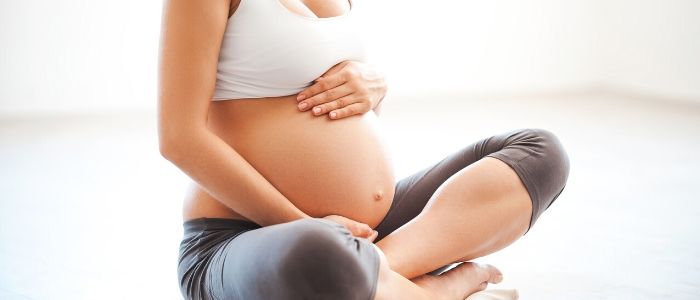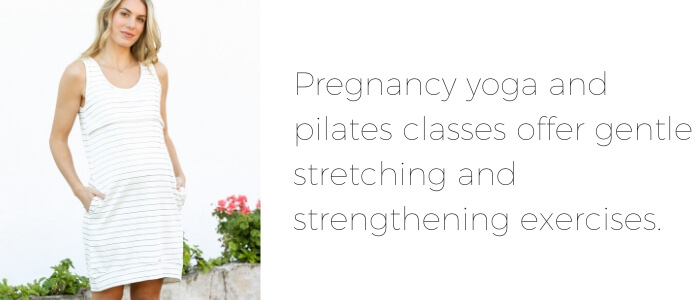
"A strong body helps to carry the added weight of pregnancy. Exercise improves your balance and stability, increases your energy levels and adds to your sense of well-being.”
When you’re pregnant it’s important to keep yourself fit and healthy. But many mums-to-be worry that exercise harms their baby or impacts their own body.
Medical experts recommend that mild to moderate exercise 3 times a week is an ideal balance. We’ve shared what’s worth knowing about pregnancy workouts, exercises that are good for you and ones to avoid.
Why Bother Exercising?
The benefits are pretty hard to ignore. Exercise is not just a great way to stay in shape, but it also keeps painful and worrying symptoms like backaches, pregnancy induced hyper-tension, varicose veins and pre-eclampsia to a minimum. And it does wonders for your mood and long-term fitness levels.
So, is Exercise Really Good for You?
Short answer: Yes!
Long answer: Choose low impact sports and don’t overdo it.
Regular prenatal exercise can help you by:-
- improving circulation, posture, strength and endurance
- reducing back and pelvic pain
- controlling or preventing gestational diabetes
- reducing bloating and constipation
- decreasing risk of pregnancy complications
- providing stress relief
- reducing bloating and swelling
- weight control
- strengthening muscle tone to make childbirth easier
- preparing you for the physical exertion of childbirth
- improving sleep management
- reducing the risk of anxiety and depression
- enhancing recovery from childbirth
Now you’re on board the exercise mat, there’s a few warnings to consider.
Pace the Race
If you had a workout program before you became pregnant, there’s certainly no need to stop now. However, in your first trimester tiredness may become the biggest issue for you, reducing your stamina and your sports performance.
Exercise during pregnancy isn’t necessarily about training for a marathon though - take it slow and steady and pace yourself.
Because your ligaments are more relaxed during pregnancy you’re also at higher risk of injury. The experts recommend you exercise 3 - 4 times a week, but any more may be overdoing it. It’s best if you limit sessions when it’s hot, and first thing the morning or at the end of the day are ideal times.

Perfect Pregnancy Exercises
Some of the most beneficial non-impact and aerobic exercises during pregnancy are:
- Walking
- Jogging
- Swimming
- Aquarobics
- Yoga and Pilates
- Cycling (but you should seek advice after first trimester)
Yoga and Pilates
Pregnancy yoga and pilates classes offer gentle stretching and strengthening exercises. But make sure that your instructor is specifically trained, as antenatal programs can differ. Yoga is so good for backpain, ligament and muscle stretching and it’s a calming workout for your mind and soul as well.
Don’t be shy about speaking up if something feels uncomfortable, a good yoga instructor is always attentive to making modifications as your bump grows.
Swimming
Workouts in the pool are so helpful as the buoyancy of the water supports your bump while working your abdominal muscles. Swimming is one of the exercises specialists most recommend during pregnancy as it doesn’t increase the body’s temperature as quickly as other sports. It’s also the closest you get to zero gravity with the water supporting your body’s weight. Even if you can’t swim, pool walking can be a great workout. This is particularly helpful in the later stages when your bump feels very heavy.
Gym Time
If you’re working out while pregnant make sure you seek guidance from a qualified instructor. Using equipment at a professional gym can strengthen your back and pelvic muscles. But if you’re using gym equipment have a trainer on hand to advise on the best abdominal exercises to suit your stage of pregnancy.

Seated Stretches
Chair based workouts and stretches can really help in strengthening your muscles and ligaments and making them more pliable. Stretching is nature’s prescription for relaxing the body, and it also relieves stress. Physio’s can help with tailored workout and stretching programs to alleviate discomfort and increase your flexibility.
Exercise Right and Keep Safe
The changes in your body when you’re expecting can influence how your body responds to workouts. Strained joints, back-aches and breathlessness may all be inflamed if you don’t exercise correctly.
If you’re doing abdominal exercises, you’ll need to take care not to overstretch those already expanding recti muscles! And listen to the experts who advise that if you experience any bleeding, at any stage, then just take it easy on the exercise circuit until the bleeding has stopped. Make sure you check in with your doctor too
Keeping Yourself and Your Baby Safe is the Most Important Thing
If your exercise program has included impact or contact sports, get some advice first from your doctor regarding what’s best suited for you during your pregnancy.
Exercises to Avoid
Doctors and medical experts recommend avoiding exercises that put you in harm’s way. Any sports where you could fall, be hit or kicked in your stomach, knocked off balance, or even at risk of losing oxygen is a danger to you and to your baby. That rules out horse riding, football, soccer and rugby, tackling, wrestling, skiing and diving.
If you’ve got a favourite exercise routine, ask your doctor or midwife for their advice and research as to where it’s safe for you. If you’re in doubt or discomfort, the rule of pregnancy exercise is doesn’t do it.
Top Workout Tips:
- It’s worth investing in a comfortable sports bra and exercise shoes to give you the utmost support
- Sip on water to stay hydrated and munch on protein carbohydrate rich snacks to provide energy
- In your second trimester focus on exercises that strengthen your upper and middle back, shoulder and chest muscles – this helps support shifting weight, maintain posture and strengthen muscles to support your spine.
- Repetitions of exercise done too quickly may cause muscle cramps, so don’t overdo it
- Find more helpful exercise workout advice at https://www.betterhealth.vic.gov.au/health/healthyliving/pregnancy-and-exercise
Your body is protecting a precious life; it makes sense to keep it in top shape. Whatever pregnancy exercise you keep step with make sure you take advice from experts who know how a woman’s body changes during pregnancy.
